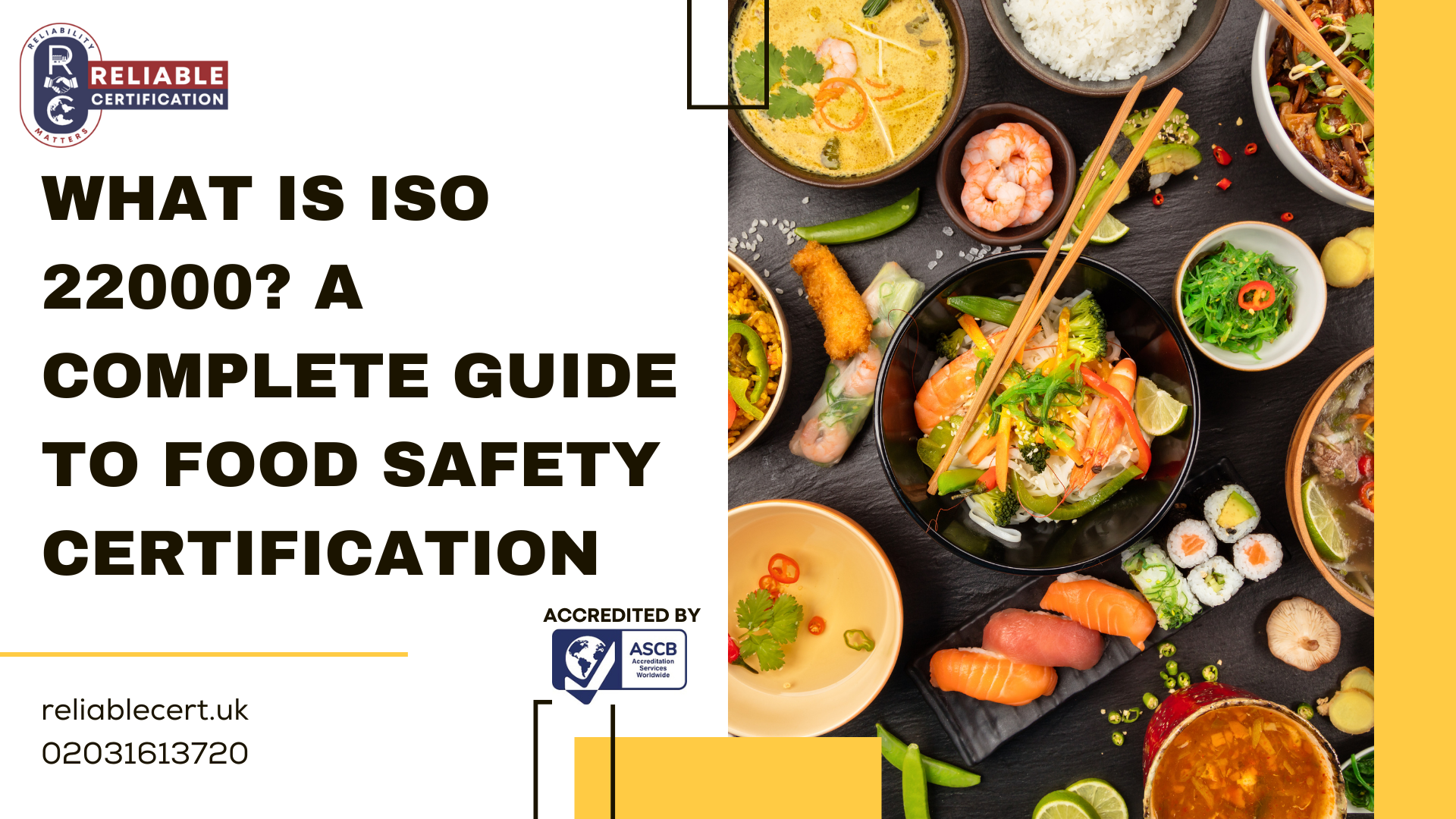Learn what ISO 22000 is, why it matters, and how it ensures food safety. A complete guide to ISO certification for food businesses. Start your journey today!

In today’s global food industry, ensuring food safety is not just a responsibility it’s a necessity. Contaminated or unsafe food can lead to serious health consequences, damage a company’s reputation, and even result in costly legal actions. That’s why more and more businesses are turning to ISO certification as a mark of trust and safety. One of the most widely recognized certifications in the food sector is ISO 22000 Food Safety certification.
In this guide, we’ll break down everything you need to know about ISO 22000, how it supports food safety management systems, and why it’s vital for your business whether you're a food manufacturer, processor, distributor, or retailer.
ISO 22000 is an international standard developed by the International Organization for Standardization (ISO) that outlines the requirements for a Food Safety Management System (FSMS). It applies to all organizations in the food chain — from farm to fork — and ensures that food is safe for consumption.
The goal of ISO 22000 is to:
It’s a globally recognized certification that proves your company is committed to maintaining high food safety standards.
For more details on ISO 22000, you can also visit the official ISO page:
ISO 22000:2018 - Food safety management systems
Why Is ISO 22000 Important?
The food industry operates in a high-risk environment. A single error in handling, storing, or processing can lead to serious health issues or even fatalities. With increasing customer expectations, regulatory requirements, and global trade, having a standardized food safety process isn’t just beneficial—it’s critical.
ISO 22000 offers:
In short, ISO 22000 certification shows that your organization puts safety first and that’s a strong competitive advantage.
An FSMS is a structured approach to identifying, controlling, and preventing food safety hazards in an organization. ISO 22000 provides a framework for building and managing an effective FSMS based on the Plan-Do-Check-Act (PDCA) model.
One of the strengths of ISO 22000 is its full integration with HACCP (Hazard Analysis and Critical Control Points) — a globally accepted method for food safety risk assessment.
ISO 22000 not only incorporates the seven principles of HACCP but also strengthens them by adding additional layers of system management, communication, and performance evaluation.
By combining ISO 22000 with HACCP, your business can create a foolproof safety system that reduces risks and meets global expectations.
Any organization directly or indirectly involved in the food supply chain can benefit from ISO 22000 certification. This includes:
Whether you're a small business or a large multinational, ISO 22000 is scalable and adaptable to your operations.
Achieving ISO 22000 certification requires preparation, documentation, and commitment. Here’s a step-by-step overview of the process:
Review your existing food safety practices and compare them with ISO 22000 requirements.
Develop a tailored Food Safety Management System using ISO 22000 as a framework.
Ensure your team understands ISO 22000 processes, HACCP, and food safety best practices.
Prepare necessary documents, including PRPs, hazard controls, procedures, and records.
Roll out the FSMS across your operations and monitor performance.
Conduct an internal review to identify gaps or non-conformities.
Senior management reviews the audit findings and recommends corrective actions.
An external auditor will conduct the official ISO 22000 audit to verify compliance.
If successful, your organization receives ISO 22000 certification typically valid for 3 years.
The ISO 22000 audit is a formal review carried out by a third-party certification body. It includes:
Regular surveillance audits may follow to ensure ongoing compliance.
Implementing and maintaining ISO 22000 offers numerous tangible and intangible advantages.
Enhance your food quality control processes and reduce risk of contamination.
Meet global and local food hygiene compliance standards effortlessly.
Certification helps expand into new markets with stringent food safety regulations.
Show stakeholders and consumers that you’re serious about food safety.
Streamline internal processes and reduce waste with systematic controls.
Get ahead of competitors who lack formal food industry ISO certification.
You might be wondering: how does ISO 22000 compare to other schemes like BRC, FSSC 22000, or SQF?
|
Standard |
Scope |
Global Recognition |
Integration with ISO |
|
ISO 22000 |
All food chain businesses |
✅ Yes |
✅ High |
|
BRCGS |
Retail & packaging focus |
✅ Yes |
❌ Low |
|
FSSC 22000 |
Based on ISO 22000 + PRPs |
✅ Yes |
✅ Very High |
|
SQF |
North America-focused |
⚠️ Limited |
❌ Not ISO-based |
ISO 22000 is ideal for companies seeking a truly international standard with flexibility, strong system focus, and the power of HACCP integration.
If you operate in the food sector, ensuring food safety isn’t just good practice it’s non-negotiable. ISO 22000 certification empowers your organization to manage risks, maintain compliance, and deliver safe, high-quality food products to consumers around the world.
Whether you're a local supplier or part of a global chain, implementing a robust food safety management system aligned with ISO 22000 can elevate your brand, protect your customers, and unlock new business opportunities.
At Reliable Certification, we help businesses across the food sector achieve ISO certification with ease. Our expert team guides you through every step — from gap analysis to audit readiness, so you can focus on what matters most: producing safe and trusted food.
Typically replies within 30 minutes